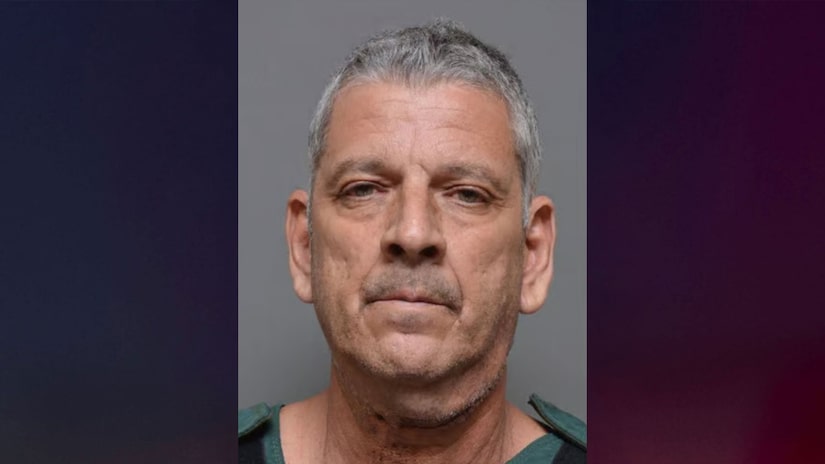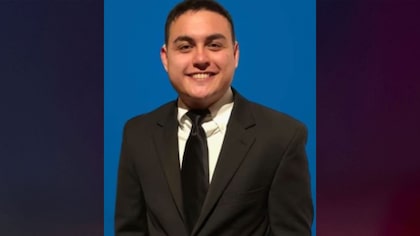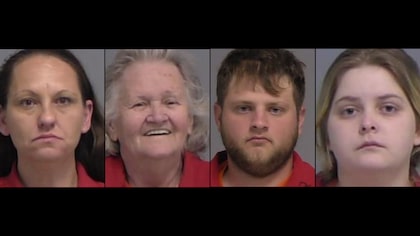Former Ivy League professor free after serving 10 years for bludgeoning wife to death
02/22/2017 1:03 pm PST
The wife of an Ivy League professor is brutally murdered while wrapping Christmas presents in her home. And the killer is currently walking the streets a free man.
Ellen Gregory Robb's tragic story all starts just a few days before Christmas 2006 in the upscale city of King of Prussia, Pennsylvania, just north of Philadelphia.
December 22, 2006 in the affluent area of Upper Merion Township, Pennsylvania. Rafael Robb, a professor at the University of Pennsylvania calls police to report he found his wife Ellen lying dead in a pool of blood in their home.
In minutes, police arrive and cordon off the area. Inside, it appears that housewife and mother, Ellen Robb was wrapping up last-minute holiday gifts in the kitchen.
"She had been seated at a kitchen table, actually, oddly, facing the wall," said former Montgomery County District Attorney Bruce Castor.
Ellen Robb, 49, never sees it coming. Police initially think she's been hit with a shotgun blast to the face. Crime scene investigators document the bloodbath. They find shards of glass by the back door. Investigators think it could have been a burglary gone wrong.
Police speak with Ellen's husband, Rafael Robb. They ask him where he was during the morning hours his wife was viciously murdered. Rafael explains he took his 12-year-old daughter Olivia to school, stopped at a local grocery store, then dropped off his grades at the University of Pennsylvania, before returning home to find his wife.
Investigators pull surveillance footage of his various stops. Rafael's alibi appears to check out.
As police continue to collect evidence and piece together what happened, Ellen's brother Gary Gregory arrives at the home. He's there to pick up his sister for the holidays.
"She was going to come up to Boston to celebrate her 50th birthday, to celebrate Christmas with her daughter and our family," said Gregory.
Then, in front of a swarm of patrol cars, a yellow school bus pulls up. It's Rafael and Ellen's 12-year-old daughter Olivia. Gregory sends his niece to a neighbor's house while he tries to comprehend the tragedy unfolding in front of his eyes.
Authorities continue to investigate the case as a burglary gone horribly wrong. They wonder if there's a murderer on the loose looking to rob housewives alone in their homes.
"There was a little dog there, and animals invariably walk in the blood and trample blood prints all over the place, but the dog was locked in a bedroom," said former D.A. Bruce Castor. "Who does that? No burglar would do that."
And there's something else that's troublesome for detectives: the broken window pane on the door where the burglar allegedly gained entry.
"None of the glass is crushed beneath where the killer would have walked," said Castor.
And it's not just contradictory evidence on the floor. It's on the ceiling too.
"The way the blood cast-off had been found on various patterns, especially on the ceiling," said Castor.
Detectives believe the blood-spatter patterns don't match up with a shotgun blast to the face. Their suspicions are confirmed.
Ellen's X-rays come back from the morgue showing that she died from blunt-force trauma injury, not a gunshot wound.
Ellen Robb was innocently wrapping Christmas presents in her home outside of Philadelphia when someone attacked her and bludgeoned her to death. The initial reports are it could have been a robbery gone bad, but some of the evidence at the crime scene is starting to tell a different story.
"Ellen Robb's face was obliterated," said former Montgomery County District Attorney Bruce Castor.
Now that police have ruled out a burglary gone wrong, they start to believe the murder is an inside job.
"I cannot tell you how many murders I did in my career where the last person to see someone alive and the first person to see them dead is the killer," said Castor.
And in this case, that person is Ellen's husband, Rafael Robb.
"It was apparent pretty quickly that he did have motive," said Castor.
When police interview Ellen's brother, they find out Ellen didn't die on just any day. Ellen was leaving Rafael, and Gary was on his way to take his sister and her daughter Olivia to Boston.
"He clearly understood she was leaving, and it was at that point of her freedom that he struck her down and killed her," said Gregory.
According to Ellen's brother, she planned to divorce Rafael after years of verbal, mental, and more recently physical abuse, according to Gary Gregory.
But if Rafael Robb has the motive to kill his wife Ellen, what about his seemingly solid alibi? Just like his wife's murder, the alibi is overkill.
"He would be in places where there he knows that there would be surveillance video," said Castor.
Detectives claim at one local convenience store, he stood in front of a surveillance camera for several minutes for seemingly no reason while he drank an entire soda.
"So amateurish as to be laughable," said Castor. "It was creating a series of places he had gone that would be plausibly linked together. It was not in conformity with what we thought the timeline was."
That now makes it possible that Rafael was at home during the time his wife was ruthlessly slaughtered.
While investigators zero-in on Rafael, they lack one crucial piece of the puzzle: the murder weapon. A murder weapon is never recovered. Still, prosecutors move ahead with their case.
"I arrested him and charged him with first-degree murder," said Castor.
But Castor doesn't believe Rafael is a cold-blooded killer.
"I didn't think that it fit the evidence," said Castor. "I had a written report from two psychiatrists, one psychologist and one psychiatrist, telling me that this was a 'rage killing.' A rage killing, where the killer strikes more blows with more force far more than is necessary to bring about death. That tells us the type of mindset of the person we are looking for."
Meaning Rafael Robb killed his wife, but in a sudden loss of control, not in a premeditated action.
Castor claims it is a crime of passion brought on by a triggering event. In this case he believes it is a conversation about Ellen's plans to leave Rafael.
"He has a complete freak-out, grabs the nearest thing capable of producing death and then goes to town on her head," said Castor. "But unless he admits he did it then I don't have any choice but to put on the evidence I do have."
For the next 11 months Rafael Robb sits in jail on first-degree murder charges, facing life in prison and possibly the death penalty. He swears he is innocent.
"Now I have a problem because I can't actually go and try to convince a jury that it's a first-degree case when I actually think it's voluntary-manslaughter case," said Castor.
Then, just before Rafael's case is set to go to trial, he cops to the brutal slaying of his wife. Rafael admits to prosecutors that he beat his wife's face in with a nearby chin-up bar. Then he staged the break-in and disposed of the weapon and bloody clothes in a trash bin in Chinatown. In his words, he just "lost it" when he learned Ellen planned to take their daughter to Massachusetts.
"The facts that developed fit the forensics," said Castor.
Rafael's confession is game-changer for the state's case against him.
"It no longer is a provable first-degree murder case, in my judgment, because remember, it's proof beyond a reasonable doubt," said Castor.
And prosecutors believe a crime of passion or rage killing creates enough doubt to derail a first-degree murder conviction, which requires proof of premeditation.
"The district attorney, he stated there was a lot of circumstantial evidence, no murder weapon was found, and that he felt that it would give the family peace to accept a plea deal," said Ellen's brother Gary.
As part of a negotiated plea deal, Rafael pleads guilty to a voluntary manslaughter charge, which carries a maximum sentence of 20 years.
But in a shocking decision by the court, the judge sentences Rafael Robb to a lesser sentence of just 10 years, and Rafael has a chance of parole after only five years.
Ellen's family is horrified by the verdict.
"I argued that the facts and circumstances warranted the maximum sentence of 20 years, and the judge didn't agree and imposed the 10-year term," said Bruce Castor. "I didn't expect him to do that."
But it did happen and now Ellen's family has to live with the verdict and live without their loved one. And just as Ellen's family feared, Rafael Robb is set free after serving just five years behind bars.
"It's remarkable to think that after serving only five of a five- to 10-year sentence, he was actually paroled by the Pennsylvania parole board," said Gregory. "It's very troubling, very troubling."
But Ellen's brother is determined that Rafael serve the full 10 years,
"We decided to fight it because it was an outrage, not only to our family, but to all victims of domestic violence and abuse," said Gregory.
And in an unprecedented and historic move, the parole board makes an announcement. "My message to Mr. Robb is that 'This is the captain speaking and your flight to freedom has been cancelled,'" said Pennsylvania State Rep. Mike Vereb (R-Montgomery).
"In the first time in the history of Pennsylvania, parole was rescinded for a violent offender, and rightfully so," said Gary Gregory.
Rafael Robb is suddenly heading back to prison to finish out his full 10-year sentence. But Ellen's family is just getting started.
A new team of lawyers is on the case. And they say they have new evidence that changes everything.
Outraged by the light sentence, Ellen's family wants justice and moves ahead with their wrongful-death lawsuit filed during Rafael's attempt at a five-year parole. Ellen's family hires attorneys Andrew Duffy and Robert Mongeluzzi to represent their civil case.
"The family came to us and asked us to prove that he premeditated the murder," said Duffy. And after reviewing the evidence, they think they have a strong case.
"Anybody who did this to any human being, let alone his wonderful wife and mother of his only child, should spend every second of their life in jail, for the rest of their life, period," said Duffy.
The plaintiffs' attorneys break down the evidence that they presented to a civil jury. They start at the beginning: Rafael's phone call to police.
"Rafael Robb did not call 911," said Robert Mongeluzzi. Robb called the direct police line. "He didn't do that because he wanted to set up his alibi. He didn't want to be recorded, he would have known that 911 would record his call and his voice, and chose to call the local number."
Another thing they say points to premeditation was the complete lack of blood evidence found on Rafael. Attorneys Duffy and Mongeluzzi argue, How in the world would that be possible in the middle of such a bloodbath?
"He claimed that somehow after the murder in this slaughterhouse that he took off his shirt and his pants, his socks, and his shoes, somehow hopped across the blood-spattered floor to the hallway, went upstairs, found baby wipes, cleaned himself up, changed clothes, without a single drop of blood -- it was incredible implausible and an absolute lie," said Mongeluzzi.
They have their own theory to explain the lack of blood on Rafael -- and it's explosive new evidence.
"He had a Tyvek suit and police found an additional Tyvek suit, a hazmat suit, in his BMW," said Mongeluzzi.
Make that two hazmat-style suits, according to the plaintiffs' attorneys. One suit used in the murder, and the other, a backup suit, Rafael Robb forgot to discard with the other evidence.
"Tyvek suits, if Rafael Robb was a chemist, if he worked in an industrial plant, he would have a potential justification for having a Tyvek suit in his BMW," said Duffy. "Rafael Robb was a professor of economics at the University of Pennsylvania. There was no rhyme or reason why he would have a Tyvek suit in the back of his BMW.
"We proved that the blood trail stopped abruptly in the garage, and that only means a Tyvek suit was on, was taken off, was discarded, so the only thing left after the Tyvek was taken off was a blood-free murder," said Duffy.
Then there's the issue of the murder weapon, which was never recovered.
"Rafael Robb claims that he began to argue with Ellen, he grabbed a chin-up bar. We could find no evidence there were any brackets for a chin-up bar. It seems implausible, and then he beat her to death with it," said Mongeluzzi. "Those wounds that were found on Ellen Gregory Robb were sharp, lacerating wounds that are consistent with a sharp object such as a crowbar, and not a round chin-up bar."
Then they enter into evidence pictures of the Robb's garage and the tools hanging on the walls.
"We have a picture of all the tools lined up, and a crowbar happened to be missing," said Duffy. "the physical facts pointed this was not a chin-up bar. This was absolutely a jagged edged instrument such as a crowbar."
Which the plaintiffs' attorneys argue means he had to go find the weapon. It wasn't just nearby and grabbed in a fit of rage. It shows pre-thought and planning on Rafael's part. Also, they claim a crowbar-type weapon better explains the horrific damage done to Ellen's head.
"I will never be able to get those photos out of my mind," said attorney Andrew Duffy. "Ellen was unidentifiable. He had literally beaten her face in to remove her identity, and the pictures showed that."
The civil trial lawyers then point to something obvious: Rafael Robb's job at the University of Pennsylvania. He's an economics professor who specializes in game theory. It is the science of logical decision-making involving strategic thinking and planning.
"People who are proficient in game theory plan things out, they have backup plans," said Mongeluzzi.
"This was a premeditated murder," said Duffy.
"He had it all planned out, but he didn't plan on his story unraveling so quickly," said Mongeluzzi.
Then they introduce a letter written by Rafael to his daughter Olivia two years after the murder.
"This is the letter that in hindsight was the single most important piece of the civil trial," said Duffy.
In the letter, Rafael is asking for photos of his daughter and the two of them together. He is hoping to show that he is a good father in order to receive a lighter punishment during the sentencing phase. In exchange, he promises to send her Christmas gifts and money.
"He goes on: 'I'd hate to delay sending you the gift, but I won't do so unless I get these items. Won't the love of money propel you into action? Love and kisses, Dad, xoxoxo.' That says it all," said Duffy.
With all this damning evidence, the civil trial kicks off. Attorney Robert Mongeluzzi comes out swinging in his opening remarks.
In civil court transcripts, he states:
Mongeluzzi: "You are a killer and a liar, Mr. Robb, aren't you?"
Robb: "Killer, yes, liar, too, yes."
In one stunning courtroom exchange, it appears Rafael is blaming his wife for her own murder.
Robb: "My wife pushed me."
Mongeluzzi: "So you're claiming to this jury that Ellen provoked you into murdering her, is that right?"
Robb: "She pushed me. I got angry. I lost my faculties. That's what happened."
Then plaintiffs' attorneys call their star witness: Olivia Robb, now 20 years old. It's the first time she has seen her father, Rafael, since the fateful day eight years before.
Olivia's testimony is documented in court transcripts.
Duffy: "Olivia, before your father took your mother from you, did you fear your father?"
Olivia: "Yes."
Duffy: "Why?"
Olivia: "My father could just lose his temper really rapidly and quickly."
The civil trial ends, and the attorneys for Ellen's estate rest.
"We proved that Rafael Robb intentionally and with premeditation murdered his wife," said Mongeluzzi. "This was no crime of passion, this was an intentional act planned and executed in devastating form."
And the jury agrees awarding the largest civil suit payout in Pennsylvania history: $124 million.
Despite all of the evidence in the civil trial, Rafael Robb is out of prison, living as a free man. He walked out from behind bars in January 2017, after serving his full 10-year sentence for manslaughter.
And while Rafael Robb can never be tried a second time for murder, Ellen's family has decided to turn their tragedy into triumph.
They create the Every Great Reason Foundation, an acronym for Ellen's initials. (Follow the foundation on Facebook here.)
"We have passionately worked for nearly a decade to achieve many goals on behalf of victims of domestic violence and abuse," said Gary Gregory, Ellen's brother.
Most notably, "Ellen's Law," which allows victims to meet with the parole board prior to any prisoner's release.




